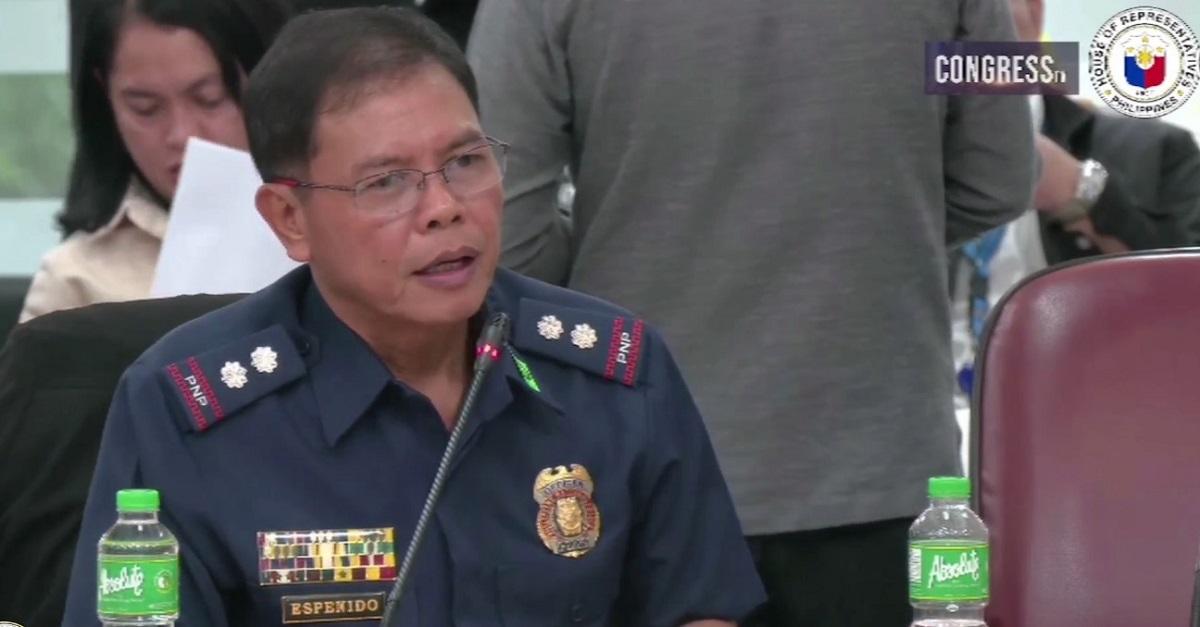Espenido: Duterte drug war set quotas, dangled rewards

Police were required to visit 50 to 100 households of suspected drug users and traffickers a day and were rewarded P100,000 for successful drug busts during the Duterte administration, Police Colonel Jovie Espenido said Wednesday.
“I confirm that there was a quota and reward system in the implementation of the war on drugs during the previous administration. I truly wanted to implement it without causing deaths. When the leadership imposed a quota of 50 to 100 per day, we only took it to mean that we had to knock on the doors of 50 to 100 households suspected of drug use or trafficking,” Espenido testified during the House investigation into the drug war deaths during the administration of former President Rodrigo Duterte.
“I also made sure that the rewards my stations received are legitimate. For example, some LGUs would award P100,000 for successful arrests involving big-time drug pushers. We accepted these to fund further operations,” he added.
Espenido said that there were also rewards per kill in the drug war, with the budget for the rewards sourced from state-run Small-Town Lottery (STL) operations.
“I know that there was a reward of P20,000 per kill in the drug war. The funding came from operators of Small-Town Lottery, or jueteng lords who give money to the police regional commanders, provincial commanders, down the line. The group or individuals who make the kill receive the money,” he said.
“The STL money is remitted directly to the RD [Regional Director] or PD [Provincial Director]. The same goes for the so-called vigilantes. The flow of money was automatic,” Espenido added.
Asked for comment, lawyer Salvador Panelo, who was Duterte's chief presidential legal counsel and also his spokesperson for a time, told GMA News Online: "No such policy in the Duterte administration as far as I know."
Espenido also told the quad committee that he was not after killing drug suspects.
“My mission was for the drug suspects to surrender so they could be rehabilitated. Nobody died during my stints in Albuera [Leyte] and Bacolod [City],” he said.
“When I was in Bacolod, I was included as a high-level target in another drug list. Some officers were also included and they suspected me of giving their names. It is the usual tactic of police generals to place you in a list so they can float you and you cannot finish your projects or operation,” he added.
Espenido has faced homicide charges in the past over the alleged deliberate killing of drug suspects during police operations.
Two of the most high-profile cases where Espenido emerged as the central figure were the "Ozamiz 9" killings in June 2017 and the July 2017 pre-dawn police raid that killed Ozamiz City Mayor Reynaldo Parojinog, his wife, brother, and 12 others in July 2017.
Before this, Espenido was the police chief of the town of Albuera, Leyte when its mayor Rolando Espinosa was shot dead inside a prison cell in Baybay City in 2016.
Espenido is a recipient of then President Duterte's Order of Lapu-Lapu award for his “extraordinary contributions to law enforcement.”
— BM, GMA Integrated News




